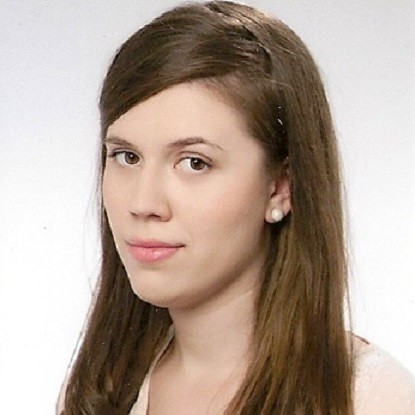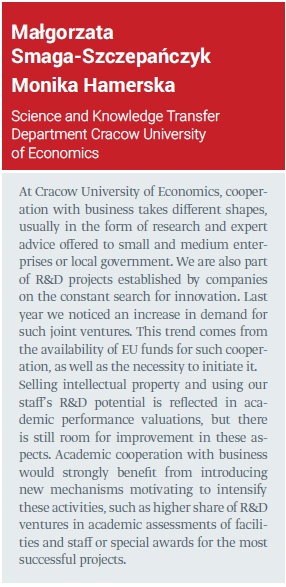Knowledge transfer: universities & business

Editor

related articles
related offers
Higher education system
Poland, as one of the signatories of the Bologna Declaration, has a higher education system that largely resembles institutions in other European countries. The document unified it into a general and easy to follow scheme of bachelor degree studies (six semestres), master degree studies (four semestres) and PhD studies (six to eight semestres). The exceptions to this rule include some majors, including medical, law or psychology students. The majority of Polish tertiary education facilities are comprised of universities of different kind, starting from those offering general education, through for instance medical, military, technical or economical universities, and even theological or fine arts academies. Colleges in Poland are practically non-existent and their name (kolegium) usually refers to some smaller university-dependent facilities that provide education on the bachelor level.
Poland has a wide offer of state-funded and private universities. The latter are gaining popularity, although public facilities still offer free education for Polish citizens, who seem to favour this path of education. For foreign nationals it is usually paid at either of these school types; the fees varying depending on university type, degree, number of semestres, courses taken, and so on. All in all, Polish universities had slightly over 60,000 foreign students in the academic year of 2016/2017. Their Polish co-students and the entire academic scene are hoping for more – such cooperation always facilitates knowledge transfer, a phenomenon necessary in academia.
 Business & Polish universities
Business & Polish universities
Out of all the aforementioned types of universities available in Poland, not all and sundry have equal chances in successfully cooperating
with business entities, nevertheless these partnerships occur more and more often. They help bridge the gap between two seemingly distant areas in many various ways.
Spin-offs
One of them is the increasing focus on commercialisation of research findings. This is why Polish universities are so keen on establishing
dedicated companies connecting their spin-off companies (often referred to as spin out) with business in order to introduce the concept and intellectual property originating within their academic circles to wider audiences. Spin-off companies often become independent establishments and the universities remain connected to them only in limited roles, for instance as shareholders. Such spin-offs are supported by all major universities, technical universities or universities of economics in Poland. They can deal with all sorts of business activities – starting with machine learning, genetics, cancer research, nanovectors, data analysis, or even… crops monitoring.
Incubators
Academics also encourage students to engage in business activities not necessarily dealing with university intellectual property. Facilitating general entrepreneurship among students is widely beneficial for the economy and of course graduates themselves,
so tertiary education facilities strive to offer more and more opportunities for young entrepreneurs. For instance, there is a wide network of academic incubators aiming at providing legal and financial help, business plan guidance or even tests of your business activity before leaving the incubator and trying out the real market. It is also important for young entrepreneurs to share their experience in coworking areas and do business with lower social security contributions. As of 2017, academic incubators operate in 24 Polish cities.
Business academies at universities
Different businesses may literally visit universities to present their work mechanisms, innovative solutions, recruitment methods, or simply even job offers. This sometimes very close cooperation results in establishing various business academies, which in exchange for companies’ practical knowledge give them stage to present their activities and possibly acquire new workforce in the future. Such academies are most popular at economic universities or in other university business departments, but of course all kinds of companies introduce themselves to different groups of students. The latter are usually eager to take part in such ventures – after all it enables them to acquire new skills during workshops, get extra points for their resume or even gives a chance for professional networking.
A good example of such an activity is the cooperation between the Koźmiński University (ALK) in Warszawa and Accenture Operations Poland.
We have been supporting its two programs, Virtual Environment Management and Finance & Accounting, since September 2016. Our managers contribute also to the University’s Program Council, says our expert, Edyta Gałaszewska-Bogusz, Director at Accenture Operations Poland.
What’s in it for Accenture? Our aspiration is to support education of the talent which will shape the future business. Out of Poland, we run complex international programs for multiple global clients and we do not mind sharing our experience. We bring to the table extraordinary expertise of our people and real case studies. So far we have organised lectures on such vital business topics as, among others, e-commerce, digital marketing and financial reporting. We are planning to hire the best talents taking part in the program in the nearest future, she adds.
Such activities always deserve recognition and fortunately they get it. For its involvement with ALK, Accenture Operations Poland received the ABSL Diamonds Award in the category of Business Leader in Talent Development and Education.
Sometimes cooperation stretches even beyond the university environment – reaching back to high schools, where specific companies set up their patron classes for students interested in joining them sometime in the future. Some of these classes are created in a wider context, under the auspices of special economic zones (these are more vocational in nature). Of course joining the company is not an obligatory condition for graduates and young people can use it to simply gain experience they would not have acquired without benefiting from such programmes.
Does it work?
The question remains: if the higher education system in Poland is so encouraging and supportive, does it present any measurable benefits, success stories or other incentives for the future? The answer is: sure it does! When it comes to patents, this field of activity is literally powered by Polish universities and research centres constitute a major part of patent-filing institutions in Poland (6 out of 8), with Jagiellonian University leading the way. Overall, even outside academia, the number of Polish patents in all areas is on the rise and gives a good hunch for the years to come. Polish academic teams are often reported to have won or at least come in at high
positions in international student contests. Only in recent years did they score high results in such disciplines as:
- Programming (Warsaw University team were runner-ups in the 41st Annual World Finals of the ACM International Collegiate Programming Contest 2017);
- Space exploration (Rzeszów University of Technology team won for the second time in a row in University Rover Challenge 2016);
- Aerospace engineering (Warsaw University of Technology in SAE Aero Design West);
- Energy production (Łódź University of Technology in International Small Wind Turbine Contest 2017);
- Robotics (Polish high-school students from Kraśnik were runner-ups in the FIRST Global Challenge 2017);
- … and many more.












